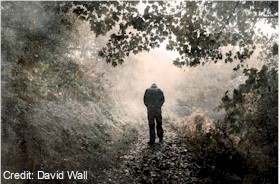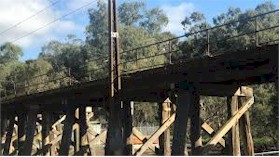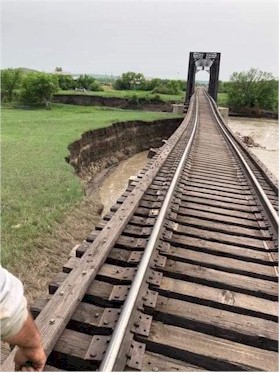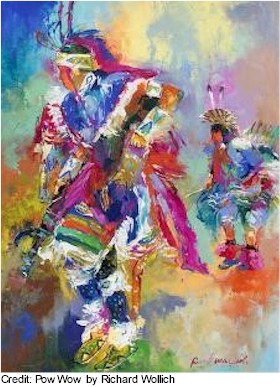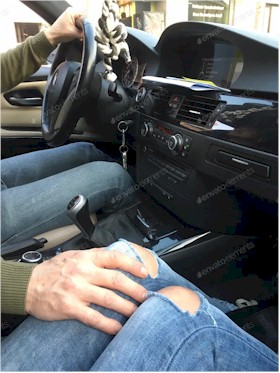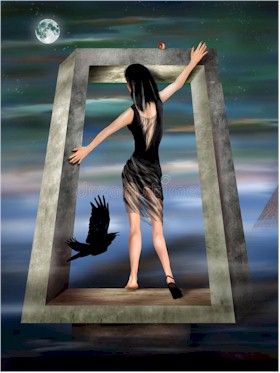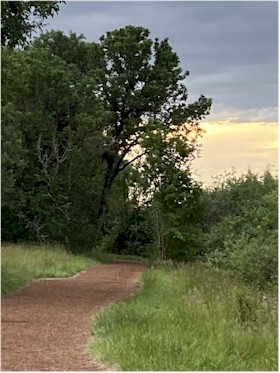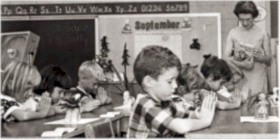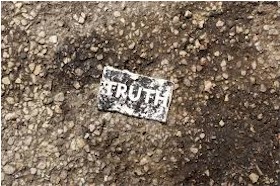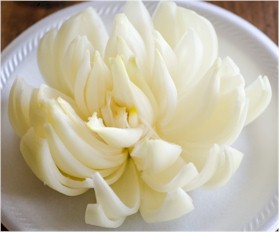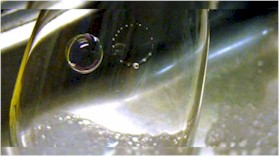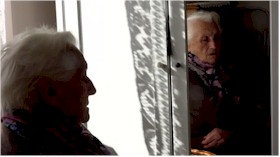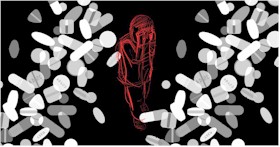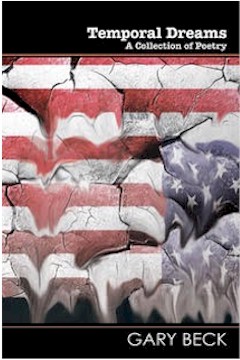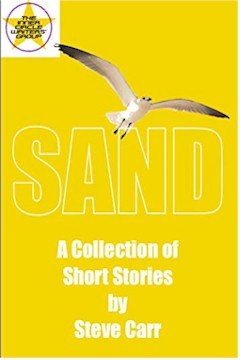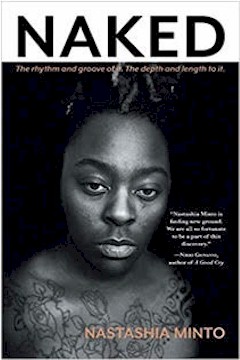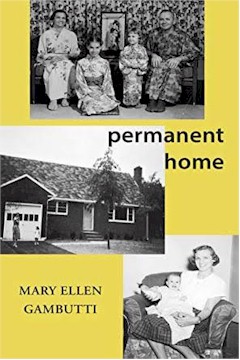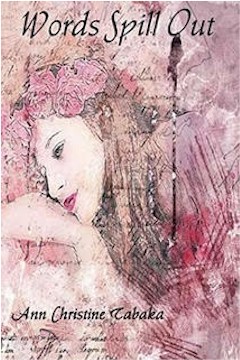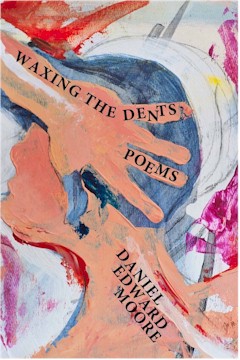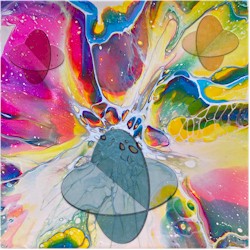Portland Metrozine |
| The Missouri River Story |
By Steven Carr |
| Twelve Dreams I've Had About You |
By Penny Pennell |
| Meadow Memories |
By Margo Adler |
| Reconciliation Suite |
By Gail Acuff |
| Pandemic Blue |
By Tom Bierovic |
| Boogey Man — Don’t Think — Fine Diners |
By Yash Seyedbagheri |
| Gallery Walk |
By Edward Lee |
| A Tale of Domesticity: the Suds and Ends |
By Amrita Valen |
| Poetry Suite |
By Ann Christine Tabaka |
| Idioteque |
By Clara Roberts |
| Away and Within |
By Mary Ellen Gambutti |
| The Fiction of Roy Quickly |
By Peter Fraser |
| Slice of Life: Altered State |
By Prisoner # 53.3.8.5.7 |
| Spotlight On: Our Evolving Normal |
By Basha Krasnoff |
|
|
| Short Story Fiction |
The Missouri River Story By Steven Carr
Jack awoke and opened his eyes to the sight and sound of box cars packed with cattle crossing the tracks over his head, showering dust and bits of hay down on him. He covered his face with his arm and lay still which protected his eyes but did nothing to stop the strong odor of cow manure from assaulting his nostrils. While the train passed, he tried to remember where he was and what day of the week it was. After a couple of minutes of concentrating really hard he remembered it was Sunday but couldn't for the life of him recall where the railroad bridge was that he was now lying under. It was north of the Badlands in South Dakota, that much he knew, but even the memory of the ride he accepted to get to where he was, was hazy at best. What he did remember was that it had been night and much warmer. He also remembered a hand being placed on his leg, squeezing it, and that was all. As the last car of the train clacked off the far end of the tracks, Jack removed his arm from his face and looked around. The bridge above him was no different than any other railroad bridge, a combination of steel and wood and cables, blackened with age, weather, use, or paint, he couldn't tell. Not far down the slope thick with prairie grass that he was lying on passed the gentle gray currents of a river. There were no trees on the bank he was on and none on the bank on the other side.
The houses on this side of the river were about a half mile down river and along with those along the ridge on the other side revealed nothing special about their occupants, their history or their location. There were no boats of any size on the river or any piers jutting out into it and no landing docks. Other than the now faint sound of the train disappearing in the distance on its journey to wherever it was headed, and the slight splashing of the river currents against the bank, it was very quiet. At the side of the sleeping bag his clothes were laid out as if by a stranger who had just evaporated in them after lying down. His bladder suddenly made its presence known and need to be emptied. Unzipping the bag, he shivered as the cool air washed over his naked skin. As he stood up and looked down the length of his lean body he wondered how he had gotten the bruises along his ribs on the left side. I'll try to remember that later he thought as he faced downwind and urinated. While watching his pee water a patch of brown prairie grass he heard the growl of a dog and looked up to see a skinny black mongrel a few yards away, its teeth barred and head tucked down but staring straight at him. “Easy, boy,” Jack said softly. Despite the growling, the dog wasn't aggressive. It wasn't drooling so Jack slowly bent down and held his hand out, palm up. “I'm a nice guy pooch. I won't hurt you.” It stopped growling but it's posture and distance didn't change. “I guess I should find out where I am,” Jack said standing slowly. He got into his jeans and then picked up his t-shirt. Just before he slipped it over his head he stuck his fingers through a hole where a pocket had been. “Damn,” he muttered, “this is my last one.” He put it on. His small brown nipple showed through the hole. ▀ ▀ ▀
With his backpack and sleeping bag hidden behind a piling under the bridge, Jack made his way to the main west-east road and highway going through the town. There were barely any vehicles traveling on it, but there were a couple of motels, small businesses and restaurants; a clear indication it was a main thoroughfare even if there wasn't much to it or anything to brag about. Jack walked eastward down the narrow sidewalk with the dog following behind but still maintaining a distance. At a small gas station and convenience store, Jack went in and bought a bottle of orange juice, a package of small chocolate frosted doughnuts, and a can of dog food. He placed the items on the counter and took several bills out of his jeans front pocket. “Your shirt has a rip in it,” the teenage girl behind the cash register said to him as she rang up his items. “I know,” Jack said, reaching up and feeling the hole and his nipple. “Do you have a can opener I can borrow to open the can of dog food?” “You're not going to eat dog food are you?” she asked screwing her face into a look of disgust. “No, it's for my dog. Well, he's not my dog, but I think he's pretty hungry.” She reached under the counter and pulled out a can opener and eyed him suspiciously as he removed the lid from the can. With his juice and doughnuts in a small bag in one hand and the opened can of dog food in the other, Jack left the store. The dog was sitting on the sidewalk but backed a few feet away as Jack scooped out some of the dog food onto the pavement. Jack sat on the curb a few yards from the pile of dog food and drank the juice and ate the doughnuts. Keeping his eyes on Jack, the dog slowly crept forward, sniffed at the food, quickly devoured it, and then sat down on the sidewalk, still watching Jack. “Whatever made you so frightened of people I'm sorry pooch,” Jack said as he stood and tossed the bag, empty doughnut package and empty bottle in a waste can outside the door of the store. ▀ ▀ ▀ Led by nothing other than curiosity, Jack turned off of the main street onto a tree-lined side street. Heading nowhere in particular he gazed thoughtfully at the modest sized houses and well-kept lawns. It didn't look any different than many other small-town streets he had seen since leaving wherever it was that he had originally left. He assumed by the condition of his worn sneakers and what few dollars he had in his pocket that he had been traveling for some time and for quite a distance. Places he had seen recently along the way, like the Badlands, were still very clear in his memory. Usually, he awoke in a new place, or found money in his pocket. He had had thumbed rides from one place to the next, that much he knew, but he had no clue where the money came from.
“They will give you a ticket if you don't have your dog on a leash.” Jack turned around and looked up at a young man about Jack's age with dark skin and long black hair tied in the back into a braided ponytail. “He's not my dog,” Jack said. “He's hungry so I'm giving it some food, but he's not mine.” Jack stood up and faced the young man and reached out his hand. “I'm Jack.” “I'm John Wind Feather,” John said taking Jack's hand and shaking it. “Who gave you the black eye?” he asked pointing at Jack's left eye. “My eye is black?” Jack asked, surprised, and putting his fingertips to it and wincing. “I didn't know it was black until you told me.” “Your shirt is torn also,” John said pointing to Jack's exposed nipple. “Yes, that I know about.” Jack said suddenly feeling self-conscious and momentarily covering the hole with his hand. “I haven't seen you around here before,” John said. “Are you just visiting?” “You could say that” Jack replied. “But I'm not exactly sure where here is.” John tilted his head and looked appraisingly at Jack. “It's Griffin Park.” “I know that,” Jack said. “I meant what city is this?” he asked, sweeping his hand around like a malfunctioning compass arrow. “You don't know what city you're in?” John said, somewhat amused. “It's Pierre. The capital of South Dakota. How could you not know what city you're in?” Jack pulled at the hole around his nipple. “I wish I could explain that, but I can't.” ▀ ▀ ▀ By the time Jack and John arrived at John's house on a nearby street, Jack explained what little he could, which wasn't much. At the door, Jack scooped the last of the dog food out of the can with his hand and put it in the grass for the dog that had followed the two, keeping a safe distance behind. “Are you sure your family won't mind you bringing me home?” Jack said. “It's just me and my grandfather,” John said. “He’s very old and doesn't know where he is most of the time either so you two will have that in common.”
“Thunkashila, where are your clothes? We have a guest.” he leaned over and said loudly into his grandfather's ear. “Hau cousin,” John's grandfather said ignoring John and looking at Jack. “Thunkashila, my grandfather, is saying hello in the Lakota Sioux way,” John explained. “It's a pleasure to meet you,” Jack said, barely able to take his eyes off the brilliant colors of images of prairie landscapes, eagles, buffalo, and horses that adorned the walls. The ceiling was painted a brilliant baby blue with smatterings of snow-white clouds. “Who did the murals?” Jack asked John. “My grandfather did most of it,” he said. “All he does is paint and watch television. I did a little of it. He’s teaching me how to paint.” John turned to his grandfather, “Thunkashila I’m going to give my friend some food, okay?” “Ohan, tokse ake,” his grandfather said waving an arthritically gnarled hand at Jack while keeping his eyes on the television. John led Jack into the kitchen and had him sit at a rickety wooden table while he pulled a plate of roasted chicken out of the refrigerator and fry bread from an old tin bread box. Jack was staring at the colorful baskets and pottery painted on the walls as the food was placed in front of him. “Who taught him how to paint like this?” Jack asked. “He was taught by his grandfather. It is said by my family on Pine Ridge Reservation that my grandfather's grandfather fought at Little Bighorn and came back and put away his weapons and taught himself how to paint and never picked up his weapons again,” John said. After eating, in the bathroom, Jack removed his shirt and looked in the mirror on the medicine cabinet and saw the black and blue bruising around his eye and the bruises on his side. John opened the door. “You've been in here for an hour. I was getting worried about you. Can I come in?” John asked. “I have a t-shirt for you and some clean socks.” “Thanks,” Jack said, trying to recall what he had been doing for an hour. “Jack your back is covered in bruises,” John said coming into the bathroom with the t-shirt and socks in his hands. “You don't remember what happened to you?” “I wish I did,” Jack said. ▀ ▀ ▀
“You could stay here,” John said. “There is room with me and my grandfather.” Jack waited for a moment before answering. “Thank you, but I must go on.” “Go on to where?” John asked. “Just on, wherever that is,” Jack answered. He stood and said, “I'm tired and need to get some sleep.” “I understand,” John said sitting up and spitting the blade of grass into the river. Jack removed the t-shirt that John had given him and slid his shoes and socks and jeans off and now naked laid them all out beside his open sleeping bag as if they were still being worn by an invisible being. He laid down on his back and looked up at the dark bridge. He heard the dog lap some water from the river and then settle in the grass nearby. He said nothing as John removed all of his clothes and laid down beside him. Jack fell asleep. When he awoke John was gone.
|
|
|
| Flash Fiction |
Twelve Dreams I've Had About You By Penny Pennell We met in the blue light of time’s tangled hallways before we were ever real. When we came face-to-face, I couldn’t tell you what I knew about you or what you knew about me. Only that the corridors of time conspired for us to meet at the wrong time. I.We were in a storage facility full of antiques. People all around us came in to eat pie. Another friend told me he hated pie, so I asked why he never returned my letters. You left your conversation with Orson Wells to come and kiss me and give me a coin dated 1535. We flipped the coin to see how we end. You told me I talked too much, too fast, and then you smiled. II.A German pastry chef taught me to make a thick, cinnamon paste. You were angry when I asked about your wife and explained it hurt to think of her. I put on a long, lace, burgundy gown to chase and catch a rabbit. You showed me your teeth, all pointy and snarled. I walked away. III.In a ballroom dressed in long cloaks. Mine purple. Yours black. A mosh pit and a marble floor. We danced. We kissed. You left. IV.A woman at the high-top table next to us coughed up her gallbladder and asked if she would be okay. Of course, we tell her while she explains her marriage felt cluttered, but that she might be feeling better now. We wondered what would make us happy. I chopped off my hair and picked up the pieces to give you a bouquet. V.I only went to the conference on Scottish fairy imagery because I dyed my hair red. A storm hovered outside, keeping me at the conference. I turned around to find you sitting on the bed. You hung your head and apologized. You left the room and I chased you down the hall. VI.I was eavesdropping on the neighbors and thought I heard you talking about finding someone to trust. I tapped your shoulder. You said: I thought it would be a lot harder to see you. We dressed up like Frankenstein’s Monster and his Bride and decided to get divorced, though we’d never married. VII.In the produce section, you demanded to know why I kept running away from you. I explained it was because we were out of cantaloupe. You stared at me and left 12 messages on my phone. When I put up tiki torches inside the house, you became angry. You were the reason there was so much space between us. You said I didn’t know what I was talking about. I asked you if you loved me and you pretended you were mute. VIII.We walked the night on a desolate street. You picked up two windshield wiper blades from a sand pit and told me they would chase bad drivers away. I said it didn’t matter. I needed to use the oven because the cupcakes for the party weren’t done. Your wife didn’t want me to come inside, but you preheated the oven and told me: I’ve already had the affair. IX.At an academic party, we debated the meaning of the word bashert. I contended that throughout life bashert could change based on decisions made. The others in the room disagreed and you emphatically said that you couldn’t fight bashert. X.You stopped by to fix things around the house though I was perfectly capable. Fir trees grew tall around us. You said you missed me but had to build a fence. You Skyped me to tell me you drafted three letters to reply to mine. You asked if I knew why you were lost. XI.At a dinner party we sat across from each other. You were aloof, although you invited me. I asked you if my letter made you angry and you looked confused. I got up to make ice and you said you didn’t know about any letter. Off you went searching until you returned with a green envelope with a gold wax seal. Is this it? Yes, but the seal had changed. Someone else had read it. XII.I could see you in the blue light of the hallway where we first met. You waited. I waited.
|
|
|
| Flash Creative Nonfiction Suite |
Meadow Memories By Margo Adler ► Meadow MemoriesI am always in anticipation of a meadow, a path, a vehicle, a view.
Morning Rain, Horses and Siberian Iris greet me. Our breathing becomes one Now, we sit, with each other, Peace I ask of thee o river When I learn to live serenely From the hills I gather courage Strength to lead and faith to follow Peace I ask of thee o river ► Lost in The Palouse
The Palouse region of Washington sits in the southeast part of the state. It is a little piece of paradise, characterized by its gentle rolling hills covered with wheat fields. I find myself driving the Palouse, lost. “Turn right,” she said, “on the oiled road.” “Turn right,” she said, “where the gas station used to be.” I am an hour late. I can’t find the farm. The Palouse hills are golden with winter wheat. A breeze comes up and waves of golden grain rise and bend, miles of waves. I stop to watch wave after wave passing and passing again, whispering passes with the wind. A deer leaps up and disappears. She leaps again and this time rides the waves across the hills. I follow her and find the farm. Two women open the door. “We wondered if you would show.” “I was really lost. I don’t know what an oiled road is or where the gas station was” “How did you find us?” “The waves and the deer brought me here”. They laugh. “Hand me a wrench.” Two women Running a ranch Fixing everything ► Book of IngredientsTonight, we come together for a symphony. We exit the house Our escorts await us: Tessie my black German shepherd, who believes herself to be a little girl; Charlie, my long-haired cat who adopted us when he was a wee abandoned kitten; and Blue, my most beloved ancient pony, who once destined for auction instead chose our love. We enter the most magnificent concert hall. Waiting for the midnight star-filled sky to encompass us. our eyes adjust to the deep dark sky. The backdrop is the sky and stars and full moon lighting the valley, when suddenly a burst of meteors cross the sky. Strength arises from the hills surrounding our meeting place. A gentle joy sings from the twinkling lights of distant farms. Sleep is drifting in as mist flows over the hills and then arises from the earth as softness. The sound of the River, sweeping across the valley, flows East to West. Now, the musicians arrive: a Night Hawk, beautiful piercing call whistling past to her position in the orchard, as her mate joins her. From the forest behind us the velvety sweeping sound of the wings of the Great White Owl brushes past us from West to East as she flies over the pasture. We walk silently, approaching our box, front row. The musicians continue to enter the concert hall as miniature donkeys from a distant farm call to their young that it is time to sleep; the neighboring horse calls to us from her stall, “Do not forget me.” Once arrived, I position myself on the waiting hay bail. Lucy and Romeo, beautiful dense wooly sheep are already waiting, baaing quietly in their sleepy voices. They settle and the soft soothing sound of them chewing their cud cues Tiger, the barn cat, to join. Mewing her entrance, she jumps first to my lap, nuzzles my nose and then positions herself on the top of my head to enter her voice of purring and keeping time with patty paws. Bunbun Rabbit enters, thumps her greeting and positions herself at Blue’s hooves. Now that we are all here, it is time for my solo. Blue is conducting. He approaches me and with a soft whinny he signals me to begin. Never has a singer had a more loving and appreciative audience. I begin with “Home on the Range.” Blue places his nuzzle in my chest and hums along. The orchestra continues softly as I sing and sing and when I stop the cries for an encore persuade me to sing “Home on the Range,” one last time for the evening. "Oh, give me a home where the buffalo roam, Home, home on the range, Where the air is so pure, and the zephyrs so free, How often at night when the heavens are bright, Oh, I love these wildflowers in this dear land of ours, Oh, give me a land where the bright diamond sand, Then I would not exchange my home on the range, — “My Western Home” by Dr. Brewster M. Higley, 1874 We sat with each other that night |
|
|
||||
| Poetic Creative Nonfiction | ||||
Reconciliation Suite By Gale Acuff ► WarningOne day I'm dead and the next I'm alive ► Slain I don't want to die, at least not now, not
► I'm Going to Die and Go to Heavenat first just to be judged, my soul that is, ► Ten Minutes Early One day I'll be dead and won't worry or ► Book of Books I'll die one day and then I'll be alive
► CrossingsIn Sunday School it's all about the life
|
||||
|
||||
|
|
|
| Metrozine Gallery — Digital Paintings |
Gallery Walk By Edward Lee |
FallenNo2.jpg)

FallenNo5.jpg)
FallenNo29.jpg)

FallenNo1.jpg)
FallenNo2.jpg)

FallenNo5.jpg)
FallenNo29.jpg)

FallenNo1.jpg)
|
|
| Prose/Poetry: Haibun |
Away and Within By Mary Ellen Gamutti Youth. Idealized freedom, a time of rustic camping among trees, mountain vistas, the breath of earth—when nature held me closest to rapture. Did I consider a Maker? In retrospect, what held more sway was power of away and within; a ritual of trees and sky, and experimentation, when raw euphoria was key to my spiritual experience. We were, after all, flower children. Once, on a mountain hike near Aspen, when all ingredients were conducive, my heart sang. Mescaline heightened my senses. Roar and ripple of creek, ethereal mid-day mountain-light, and warmth of baking grasses and stone; thrill of a new birdsong, and a community of peers. In that illusory moment, I only received. Much later, I might learn to return the blessing. my life within gardens—
|
|
|
| Fiction: Short Story |
The Fiction of Roy Quickly By Peter Fraser Retirement has advantages, don’t you think? Well. For one, I’d stopped thinking about the future. Definitely. No more plans. Whatever had happened was my life. I accepted it. Then I started to examine that life. I mean I had the time. Turn it over. Assess the character. Try and pinpoint the plot. Try and work out if there was even a plot. I wanted to drink wine. At this moment, red wine. I was thinking Burgundy. But they tell me it’s too early in the day. I have to obey. Everyone enjoys offering me advice. I’m not sure why. They all must know I won’t take it. My nurse had appeared and thought it would be good for me to sit in the sun. She brought today’s Mirror and a newly brewed take-away coffee. She knew it would keep me occupied and prevent any discussion of her duty of care. A topic I had begun to enjoy. I didn’t like the sun that much, but they all said that a bit of sun was good for you. All of them in agreement. Straight away I knew it was a doubtful idea. I start to flick through the newspaper, just to get an overall impression of yesterday’s news. I liked the news already being old. Like me. It feels familiar. There’s the usual concoction. Shark attacks, wife beatings, drug smuggling, football results, crazy wild opinions, people taken by alligators, tons more stuff and even a literary half page. I hesitate over the literary page. For good reason. I know reading it will depress me. The sun is beating down on my unprotected skin. My nurse has disappeared. I’m apprehensive. But I do read the literary half page. And Juanita has published a book. Yeah? I’m thinking this is way out of the ordinary. Like unexpected. Juanita now an author. Well, it’s in the paper. There is no stopping any of this. Einstein said over a hundred years ago that time and space did not exist. They gave him a Nobel prize. He showed up in Stockholm to accept the cheque in 1922. Yet here were Roy and Juanita emerging out of a scientific complexity that everyone found difficult to believe. Straight from a finite cosmos, about a hundred billion light years across. I mean approximately. The Mirror had previously reported the actual size of the universe in detail. And I remembered it. The Fiction of Roy Quickly . Nice title. Positive review. Well known critic. The agent figure portrayed as evil, yes, I mean that was expected, endless vice, of the principal, yes, sexual harassment by, yes, lack of any literary knowledge, predatory, yes, vulgar, foul mouthed, semi-literate, lack of any taste, no dress sense, overweight, substance abuser, red hair, minor criminal connections, yes, dishonest, alcoholic, blue veined member, often tumescent in public, agricultural, yes, attention seeker, flatulent, megalomaniac, delusional, yes, she seemed to have captured Roy. She had fleshed him out with accuracy, no real fiction there. I was exhausted. What a torrent. Was Roy that evil? I suppose he was. It was the cut of those suits he always insisted on wearing. Spivvy. Chicago television gangster. I wonder why he wore them. Although he did enjoy that image and at times really played the theatrical villain. But play acting did not make him evil. It was just pretend.
You could almost feel sorry for the sad bastard. But no, we were not meant to empathise with this grotesque. She’d turned him into a cartoon. I wonder if I was in it. I could be. But I suspect not. There was a picture of her, the author, from the back cover, in an old-fashioned bikini, not bad at all. Although you had to appreciate sixties swimwear. Or actually have been there. Walked along a beach, swam in the surf. Embraced salt water, or salt air. The newspaper seemed to love the words, an obscure world, a secret world, now open to the public. There was a sense of fresh air, of revealing what had remained hidden for so long. I can’t imagine Roy thought that people would be interested. But Juanita must have known there was an audience. Roy had become a new, publicly listed, historic house, the population ready to meander through the thing and appraise the site. Walk through his kitchen, estimate the quality of his food preparation space, observe the lounge and television set up, come through his front door. Examine his bedroom, see where he slept, inspect the quality of the bed linen. Loaf through the gardens at the back of the house, observe the pitiful state of an attempted veggie plot. Then perhaps buy a memento of the visit in the gift shop. A tea towel with Roy's image on it. A coffee cup with Roy cheerfully grinning back at you. A Roy Quickly biro. A teaspoon, with the “Quickly” family coat of arms, punched into the soft metal. And Juanita's book would be available for purchase, perhaps even at a discount. The marketers would welcome this arrival. Here was a solid saleable product, something to sink your marketing teeth into. We all needed to know about quick Roy’s little empire, his manic manipulations, the doubtful deals and his secret life. Even his expense account and pick-up lines. Juanita had been his secretary for the last few years. It must have been quite productive. Dear me. Juanita a success, I pondered, ah, best of luck, hardly jealous at all. We often shared a few drinks at the end of the day in the “Working Ferret,” a pub of doubtful character. A place that Roy embraced and made his own. She was always cheerful and light-hearted. And never once mentioned her literary ambitions.
“ Roy, you hear me. Yeah, it’s me. Still talkin’? Eh? Good. I knew you would. So glad we are still mates. I’m sorry about the book, well not really, but I’m sorry about what it must have put you through. What your tiny little pissy world is dishing out. But I know you can take it. Broad shoulders. Let it bounce off you. Then hit the bastards back. I could say I didn’t mean it, but that wouldn’t exactly be the truth, kind of thing, with me. But I know, you’d understand, I had to do it. I had to escape, and it was the only possible way I could think of. You understand? Still, you must o’ made a few bucks out of it all. I mean you’re the agent. You let me sign the deal. Not just sign, you encouraged me. Did you really read it? Or not. Sit back and let your cut roll in. Spend some money on yourself, go on a holiday, get a girlfriend, buy some new clothes, you know what I mean. Relax. Chill. Tell everyone you discovered me. I don’t mind. You take the credit. I’m at this flash pub in Switzerland, Montreux, the Palace Hotel. Totally uppity. I’m staying in the rooms that old Vladimir lived in, yeah really. This is where the ancient professor retired to, I’m sitting on his bed at this very moment, in my best lingerie. Have you ever thought quality lingerie could bring about world peace? You know, make the world a safer place? No? Anyway, I think I’m......you know who, and Humbert has just got out of the shower. I know I’m going to submit. Let him do whatever he wants. He’s going to take my lingerie off with his teeth, then impale me. I’ve no intention of stopping him. I can sense his bald noggin wanting to lick my body. Every part of it. His strong furry tongue salivating. He’s taking his glasses off, there’s nothing I can do. I’m going to surrender. Sorry. Ah. Why do I go on like that? I don’t know why. Words just come out of my mouth, without any thought attached to them. Don’t know what makes me do it. Do you? This call isn’t a shock is it? But. Roy dearie. What I want is. I know, I always want. And then I want more. I want you to give me the name of a few wines to order to-night, you know, something pretentious, something way over the top, something to keep the waiters at bay. Off my back. Can you? It’s not that easy trying to keep one step ahead of the staff at this joint. They expect so much from a guest. They almost expect you to perform. And they just love to trip you up.”
Finding Roy and Juanita in the paper really made my day. A shock at first. But it developed into so much fun. How could they turn on one another? I imagined they were best of mates. OK. So, I was wrong. This life caper is one weird event. You think your life is spent, but it insists on giving more. No, it really shouldn’t. It needed to stop and leave the elderly with a brief feeling of conclusion. Don’t let it keep going, we need a real ending. It seems there are almost infinite outcomes. Although infinity does not exist. Which is a pity. Another word to be deleted. The universe is finite. Can you believe that? They can measure the thing. Well, that’s what the Mirror says. I want to see Roy before the end of my world. I’m sure he can be found. There are memories we need to agree upon. Events demanding to be clarified. We need to discuss our youth. And all those minor scenes we appeared in. And Juanita. Where the hell is she? We need to have some final drinks. She needs to give me a bit of the author’s insight. Tell me all about it. But she could be anywhere. Authors are so unreliable, particularly if they’ve made some cash. What if she’s got herself entangled in some new relationship? That’s exactly what she might do. What if it’s another author or even an editor? I mean an agent was bad enough. A bit of my advice might be worth listening to. Ah. My nurse has appeared again, a surprise visit, asking if I wanted a sandwich? More interrogation. Why not? I need to eat. It gives the body something to do. Let it process food. I said yes, but first could she turn the sundown. Surely, she can do that. It is way too loud. And I’m not even wearing a hat. I hope she has some bread from that small supermarket on the High street. It has the right taste. And this time wheel me into the fucking shade. Let the sun concentrate on someone else. There are heaps of people who would enjoy a touch of the spotlight. Let me fade harmlessly into the background. Let me contemplate what has happened. I enjoy that.
|
|
|
| Personal Essay |
Slice of Life: Altered State By Prisoner # 53.3.8.5.7 Looking at the polished steel mirror, I can hardly recognize the guy looking back at me. I toss the dull, single blade, state-issued razor in the sink to join its brothers atop a mountain of oily black hair. They stopped giving us haircuts months ago. The only other time I shaved my head completely bald was during basic training, all because a buddy of mine, we called “Boston,” said, “I bet ya twenny buhcks ya woahn't shave your head bald before we go to the gas chambah.” While I use a fresh razor to tidy up my facial hair, I watch my TV in the reflection and see the same gas I endured that training day used on civilians in the streets I nostalgically recognize and call home. Gas, I was trained to combat in war, being used on the civilians I swore to protect by the government I served. As a patriot, a liberal, a veteran, a minority, and a prisoner, my views on the state of our nation are interesting to say the least. There is a certain disconnect when incarcerated. A knowledge that the world you knew won't be the same when you get home. Something I expected to experience firsthand in a few years’ time. It’s a strange feeling to know that even if I were to get out of here this very instant, I would hardly recognize this strange 'new normal.'
|
|
|
| Personal Essay |
Spotlight On: Our Evolving Normal By Basha Krasnoff Five years ago, how could we have predicted how life as we knew it would devolve beyond recognition. In these past few years, we have worried over so many monumental events outside of our control. We have seen the basic social contract between our people, our police, and our political body torn apart and watched toxic political dynamics spill into the mainstream of our collective life. In a short while, we have seen dehumanization replace basic respect; blame supplant responsibility; and threats of violence shut down civil dialogue. In addition this all this, the social isolation and terrifying death toll of the coronavirus pandemic has reshaped every aspect of our lives. Most of us are overwhelmed but the physical, social, emotional, psychological, and political problems have been facing are not short-term or readily remedied. We have been facing indefinite uncertainty and ambiguous losses every single day for the past five years. While we have been trying as conscientiously as we can to “adjust to the new normal” since last March, this adjustment is easier said than done. How can we expect ourselves to adjust to the “new normal” when it is an ever-changing, indefinite uncertainty? Human beings are not built to continuously cope with chronic states of emergency. Researchers tell us that humans can muster surges of energy for short-term survival in acutely stressful situations, such as natural disasters, but when an emergency becomes chronic, our “surge capacity” — our collection of adaptive mental and physical systems —becomes depleted (Masten). Today, we are living in a chronic state of loss, ambiguous because we are unclear as to what it is exactly, we are losing and because we feel helpless to stop it. There is no doubt that each and every one of us is feeling the loss of a way of life. We have lost our freedom to move about in the world in the conduct of our daily lives. We are not free to gather with friends and extended family to participate in the rituals and rites of passage like weddings, graduations, and funerals that connect to one another. Even lesser “rituals” like going to the gym or siting in our favorite coffee shop or restaurant are all equally denied us. Some of us have lost trust in our government or lost an educational opportunity for ourselves or our children. All of us are attached to many rituals in our daily round that have been taken away from us in an ambiguous sort of way. And these ambiguous losses elicit the same experiences of grief as more tangible losses do. We are all experiencing varying degrees of denial, anger, bargaining, depression, and acceptance at various stages of our ambiguous losses (Boss). How can we manage the effect of all these losses? According to Stuart Brown, this requires quite a bit of creativity. He tells us that playing more is the best way to manage the crippling effects of our sense of loss. In fact, he says play is essential to maintaining our social skills, adaptability, intelligence, creativity, the ability to problem solve and more. Particularly in tough times, he says we need to play more than ever. Play is the very means by which we prepare for the unexpected, search out new solutions, and remain optimistic. Play reinvigorates us with the “surge capacity” we need to operate through our ever evolving normal. As a matter of fact, these experts (Masten, Boss, and Maddaus) agree that the best chance we have of pulling ourselves from the depths of despair and renew our energy to get through these times of indefinite uncertainty, is to pursue the following:
While we may be feeling unmoored and tossed about in an everchanging and indifferent world, we can ride this wave toward a new normal — one that we invent in the here and now by purposively maneuvering our way toward hopeful possibilities and healthy outcomes. For Deeper Exploration Stuart Brown: “Play is more than just fun” 2008 TED Talk https://www.ted.com/talks/stuart_brown_play_is_more_than_just_fun?language=en Tara Haelle: “ Your ‘Surge Capacity’ Is Depleted — It’s Why You Feel Awful: Here’s how to pull yourself out of despair and live your life.” Elemental.Medium.Com August 16, 2020 Ann Masten, PhD., psychologist and professor of child development at the University of Minnesota introduced the concept of “surge capacity.” Her a reas of interest include multisystem resilience; risk and protective processes in children and families in the context of poverty, homelessness, war, and disaster; competence and cascades; developmental psychopathology Pauline Boss, PhD., family therapist and professor of social sciences at the University of Minnesota is widely recognized for her groundbreaking research on what is now known as the theory of “ambiguous loss.” Michael Maddaus, MD, professor of thoracic surgery at the University of Minnesota, who introduced the concept of resilience bank account.
|
|
|
| CONTRIBUTORS |
| Winter 2021 |
|
Gale Acuff has had hundreds of poems published in a dozen countries in such publications as: Ascent, Chiron Review, McNeese Review, Adirondack Review, Weber, Florida Review, South Carolina Review, Carolina Quarterly, Arkansas Review, Poem, South Dakota Review, and many other journals. He has authored three books of poetry: Buffalo Nickel (BrickHouse Press, 2004), The Weight of the World (BrickHouse, 2006), and The Story of My Lives (BrickHouse, 2008). He has taught university English in the US, China, and Palestine. He currently lives and work in Zababdeh, Palestine. Margo Adler comes from a long tradition of wisdom storytelling that shares insight and reveals God's presence in our lives to foster our courage and give us the strength to persevere. She began writing poetry and stories as a way of finding solace and joy during a childhood stricken with polio, death in the family, loss, and poverty. As an occupational therapist she has used storytelling as a therapeutic tool. Her work, study and travels have taken her from Alaska, across America through Europe, Greece and Israel. She has worked with people of many cultures, professions, gifts and disabilities. Her experience with the strength, courage and resourcefulness of American farm women became a strong inspiration for her life and work. She is currently writing memoirs of her world travels (of which a piece appeared in Summer 2020 issue of Portland Metrozine), as well as children’s stories, and the story of her animal rescue farm. She resides in the Pacific Northwest. Tom Bierovic is a widely published and award-winning poet in the haiku, senryu, and tanka forms. His work has appeared most recently (2019-20) in The Bamboo Hut, Blithe Spirit, Haiku Dialogue, Haiku Universe, hedgerow, Luca's Lily Pad, Mainichi, Modern Haiku, One Sentence Poems, Presence, tinywords, Under the Basho, and Wales Haiku Journal. Recent awards (2020) include two selections in the Golden Haiku Contest (Washington, D.C.) and Runner-up and Honorable Mention in the British Haiku Society's annual awards. His books “Blink of a Duck’s Eye” and “Paper Boats” are available at Amazon.com. His suite of poems “Water Birds” appeared in the Summer 2020 issue of Portland Metrozine. In his free time, Tom enjoys reading, playing backgammon, playing Native American flutes and Irish whistles, and drumming on bongos and djembe. Tom and his wife Laurie make their home in DeLand, Florida. Steven Carr has published more than 450 short stories internationally in print and online magazines, literary journals, reviews and anthologies since June, 2016. He has had seven collections of his short stories, Sand, Rain, Heat, The Tales of Talker Knock and 50 Short Stories: The Very Best of Steve Carr, and LGBTQ: 33 Stories, and The Theory of Existence: 50 Short Stories, published. His paranormal/horror novel Redbird was released in November 2019. His plays have been produced in several states in the U.S. Steve has been twice nominated for a Pushcart Prize. His work has previously appeared in the Winter 2020 issue of Portland Metrozine. His Twitter is @carrsteven960. His website is https://www.stevecarr960.com / He is on Facebook: https://www.facebook.com/steven.carr.35977 . Steve lives in Richmond, Virginia. Peter Fraser is a writer who has published a dozen short stories in online American journals. His first novel “A Pack of Lies” was published by Editions Dedicaces in January 2015. He has worked in a range of occupations, including English teacher and Winemaker. He enjoys travel and writing. Peter lives in Newcastle, Australia Mary Ellen Gambutti is a prolific writer of the Japanese poetic forms of Haibun, Haiga, Haiku, Sedoka, and Zuihitzu, lyrical poetry and creative nonfiction in the forms of memoir, slice of life, flash, and vignette. She is a retired horticulturalist and landscape gardener, an adult adoptee in reunion, Air Force daughter, and a hemorrhagic stroke survivor. Her book, Permanent Home: A Memoir, was published in December 2018 and is available at her website . “Far and Away” first appeared in Human/Kind Jan 2019 and was nominated for Pushcart Prize. It also appeared in Drifting Sand Spring 2020. Her work has been featured in previous issues of Portland Metrozine . Mary Ellen lives in Sarasota, Florida. Basha Krasnoff is the Editor of the Portland Metrozine. She is an accomplished creative writer of poetry, short stories, and nonfiction. Basha's professional career spans academic, expository, journalistic, narrative, research, and technical writing. She has written museum and gallery catalogues for visual artists and liner notes for musician albums. She has been the editor of six publications including the original print version of this literary journal. Basha lives and works in Portland, Oregon. Edward Lee is a photographer, writer and musician whose visual works have been exhibited widely and his poetry, short stories, non-fiction have been published in magazines in Ireland, England and America, including The Stinging Fly, Skylight 47, Acumen, and Smiths Knoll. He is currently working on two photography collections: “Lying Down with The Dead” and “There Is A Beauty in Broken Things.” As a musician, he makes musical noise under the names Ayahuasca Collective, Lewis Milne, Orson Carroll, Blinded Architect, Lego Figures Fighting, and Pale Blond Boy. His blog/website can be found at https://edwardmlee.wordpress.com . Edward lives and works in Ireland. Penny Pennell is a writer of fiction whose work has appeared in Barnstorm, Sundress Blog, The Illinois Times, and other publications. An avid gardener and Chicago Cubs fan, she received an M.A. in English from the University of Illinois at Springfield. Penny lives and writes in Chatham, Illinois. @pennyrpennell Prisoner # 53.3.8.5.7 is a pseudonym for a young writer who is currently incarcerated. While serving his sentence, he shares insights into his everyday life as a prisoner refracted through his lens of intelligence, talent, and love. For these purposes, and because he is blessed with an indominable spirit, he identifies himself with this sequence of his lucky numbers. Prisoner #53,3,8,5,7 is confined in Oregon. Clara Roberts is a graduate of the MA in Writing Program at Johns Hopkins University. Her nonfiction and poetry have been published in Entropy Magazine, Idle Ink, Serotonin, From Whispers to Roars, Heartwood Literary Magazine, Trampset, and other venues. Clara lives in Baltimore where she finds material to write about every day. Twitter: @BurroughsTie Yash Seyedbagheri is a graduate of Colorado State University's MFA program in fiction. His story, "Soon," was nominated for a Pushcart. Yash has also had work nominated for Best of the Net and The Best Small Fictions. A native of Idaho, Yash’s work is forthcoming or has been published in West Ward Quarterly, Café Lit, and Ariel Chart, among others. These pieces have been published previously: “Don’t Think,” in Potato Soup Journal, “Boogeymen,” in Hallozine, and “Fine Diners,” in scissors and spackle. Yash lives in Garden Valley, Idaho. Julia Stoops has explored process-driven, mixed media work for over 30 years andis a recipient of Oregon Arts Commission fellowships in both art and literature. Her work was reviewed Art in America (2014). She was a Ucross Foundation resident in 2016. As a writer, Julia’s debut novel, Parts per Million, was published by Forest Avenue Press in 2018. Shaped by her experiences in community radio journalism and anti-war activism, it was shortlisted for the PEN Bellwether Prize for Socially Engaged Fiction. Julia earned degrees in philosophy and visual art. Born in Samoa to New Zealand parents, she spent her childhood in Japan, Australia, New Zealand and Washington, D.C. Julia has lived and worked in Portland, Oregon since 1994. Ann Christine Tabaka was nominated for the 2017 Pushcart Prize in Poetry. She is the winner of Spillwords Press 2020 Publication of the Year. Her bio is featured in the “Who’s Who of Emerging Writers 2020,” published by Sweetycat Press. Chris has been internationally published and won poetry awards from numerous publications. Her work has been translated into Sequoyah-Cherokee Syllabics, and into Spanish. She is the author of 12 poetry books. She has recently been published in several micro-fiction anthologies and short story publications. Her most recent credits are: The American Writers Review; The Phoenix; Burningword Literary Journal; Muddy River Poetry Review; The Write Connection; The Scribe, North of Oxford, Pomona Valley Review, Page & Spine, West Texas Literary Review, The Hungry Chimera, Sheila-Na-Gig, Foliate Oak Review, The Stray Branch, The McKinley Review, Fourth & Sycamore. Five of her poems appeared in the Winter 2020 issue of Portland Metrozine. *(a complete list of publications is available upon request). “Old Woman – Staring Back” previously appeared in Ponder Savant, November 2020; “On Approaching Seventy” previously appeared in Inner Circle Magazine, December 2020. Christine loves gardening and cooking and lives in Delaware, USA with her husband and four cats. Amrita Valen is a new writer who has worked in a variety of fields including insurance and hospitality. Most recently she worked as a content creator, setting questions for simulation management entrance examination papers in Deductive Logic and Reasoning in English. Amrita likes collecting rocks, even grindstone sized ones, and taking photographs of nature and natural moods of dear ones. Amrita lives in India with her two sons.
|
|
|
| SUBMISSIONS |
| Winter 2021 |
Buoyed by the thriving literary community of Portland, Oregon, we reach out to the global community to inspire, encourage and broadcast creative expression. Wherever you are on planet Earth, we welcome you to share your vision, your voice, and your point of view! The Portland Metrozine is published quarterly (Spring, Summer, Fall, and Winter), but submissions are accepted at any time. We accept simultaneous submissions but please let us know if your work is accepted elsewhere. We will consider previously published work with a citation for the original publisher and date. You can learn more about our community via Facebook. Submission GuidelinesSend an email message to the Editor at: 1. In the body of your email, please include: ■ Title of your submission 2. For document files, use MS Word (.doc, or .docx), or ASCII text (.txt). Attach your document and/or image file(s) according to these guidelines:
Creative Non-fiction: 1 essay per submission (max: 4K words) ■ double-spaced manuscript ■ one-inch margins ■ paginated
|
|
|
| KUDOS Gallery |
| Winter 2021 |

